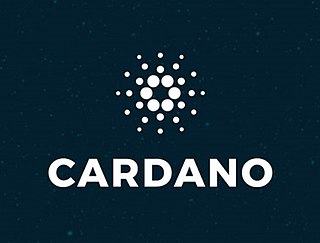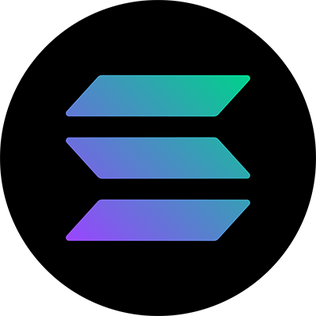A smart contract is a computer program or a transaction protocol that is intended to automatically execute, control or document events and actions according to the terms of a contract or an agreement. The objectives of smart contracts are the reduction of need for trusted intermediators, arbitration costs, and fraud losses, as well as the reduction of malicious and accidental exceptions. Smart contracts are commonly associated with cryptocurrencies, and the smart contracts introduced by Ethereum are generally considered a fundamental building block for decentralized finance (DeFi) and NFT applications.

Ethereum is a decentralized blockchain with smart contract functionality. Ether is the native cryptocurrency of the platform. Among cryptocurrencies, ether is second only to bitcoin in market capitalization. It is open-source software.
A blockchain is a distributed ledger with growing lists of records (blocks) that are securely linked together via cryptographic hashes. Each block contains a cryptographic hash of the previous block, a timestamp, and transaction data. The timestamp proves that the transaction data existed when the block was created. Since each block contains information about the previous block, they effectively form a chain, with each additional block linking to the ones before it. Consequently, blockchain transactions are irreversible in that, once they are recorded, the data in any given block cannot be altered retroactively without altering all subsequent blocks.

The DAO was a digital decentralized autonomous organization and a form of investor-directed venture capital fund. After launching in April 2016 via a token sale, it became one of the largest crowdfunding campaigns in history.
A decentralised application is an application that can operate autonomously, typically through the use of smart contracts, that run on a decentralized computing, blockchain or other distributed ledger system. Like traditional applications, DApps provide some function or utility to its users. However, unlike traditional applications, DApps operate without human intervention and are not owned by any one entity, rather DApps distribute tokens that represent ownership. These tokens are distributed according to a programmed algorithm to the users of the system, diluting ownership and control of the DApp. Without any one entity controlling the system, the application is therefore decentralised.

Cardano is a public blockchain platform. It is open-source and decentralized, with consensus achieved using proof of stake. It can facilitate peer-to-peer transactions with its internal cryptocurrency, ADA.
A cryptocurrency wallet is a device, physical medium, program or a service which stores the public and/or private keys for cryptocurrency transactions. In addition to this basic function of storing the keys, a cryptocurrency wallet more often offers the functionality of encrypting and/or signing information. Signing can for example result in executing a smart contract, a cryptocurrency transaction, identification or legally signing a 'document'.

CryptoKitties is a blockchain game developed by Canadian studio Dapper Labs. The game allows players to buy, sell, and create NFTs using on Ethereum. These NFTs represent virtual cats. The game's popularity in December 2017 congested the Ethereum network, causing it to reach an all-time high in the number of transactions and slowing it down significantly.
Binance Holdings Ltd., branded Binance, is a global company that operates the largest cryptocurrency exchange in terms of daily trading volume of cryptocurrencies.
Cryptocurrency and crime describes notable examples of cybercrime related to theft of cryptocurrencies and some of the methods or security vulnerabilities commonly exploited. Cryptojacking is a form of cybercrime specific to cryptocurrencies that has been used on websites to hijack a victim's resources and use them for hashing and mining cryptocurrencies.
A stablecoin is a type of cryptocurrency where the value of the digital asset is supposed to be pegged to a reference asset, which is either fiat money, exchange-traded commodities, or another cryptocurrency.
Decentralized finance offers financial instruments without relying on intermediaries such as brokerages, exchanges, or banks by using smart contracts on a blockchain. DeFi platforms allow people to lend or borrow funds from others, speculate on price movements on assets using derivatives, trade cryptocurrencies, insure against risks, and earn interest in savings-like accounts. DeFi uses a layered architecture and highly composable building blocks. Some applications promote high interest rates but are subject to high risk. Coding errors and hacks have been common in DeFi.
Aggelos Kiayias FRSE is a Greek cryptographer and computer scientist, currently a professor at the University of Edinburgh and the Chief Science Officer at Input Output Global, the company behind Cardano.

SafeMoon LLC is a cryptocurrency and blockchain company created in March 2021. The company also has a SafeMoon token (SFM) which trades on the BNB Chain blockchain. The token charges a 10% fee on transactions, with 5% redistributed to token holders and 5% directed to wallets in a different currency, Binance Coin (BNB), controlled by the coin's authors. The token reached its all time high market cap in April 2021 of $17b. As of December 2022, it has since dropped 98.7% in value to $223m.
Stacks, formerly Blockstack, is an open-source platform to enable smart contracts, DeFi, NFTs, and apps for Bitcoin. Stacks blockchain is a "layer" for Bitcoin similar to the Lightning Network. In addition to smart contracts, the Stacks project provides open-source software for authentication, and data storage.

Solana is a blockchain platform which uses a proof-of-stake mechanism to provide smart contract functionality. Its native cryptocurrency is SOL.
The general notion of cryptocurrencies in Europe denotes the processes of legislative regulation, distribution, circulation, and storage of cryptocurrencies in Europe.
ICON is a decentralized, open-source blockchain with smart contract functionality. ICX is the native cryptocurrency of the platform.

Bundle Africa, or simply Bundle is a social payment software that allows users to trade cryptocurrencies, send and receive fiat, and save in dollars and other currencies.
Tokenomics, also known as token economics, is an emerging field concerned with the economic properties of agent-driven systems that use cryptographic tokens that are typically created and managed on blockchain-based distributed ledgers.








